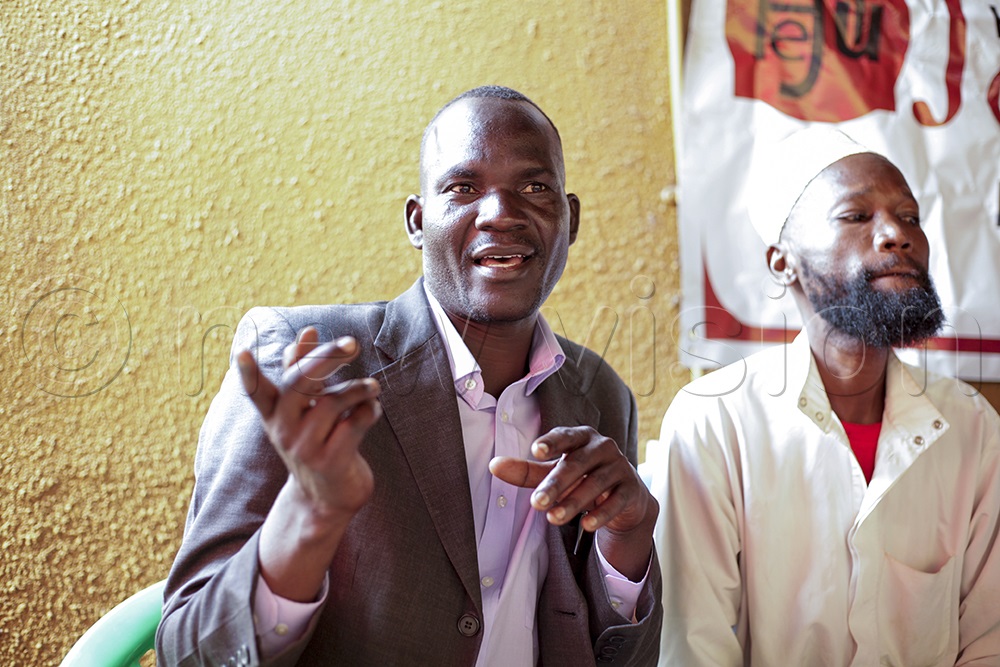Studies to reduce TB treatment period promising – experts
According to Dr Muwanguzi, any patient who misses four doses of TB treatment risks developing drug-resistant TB, which is difficult and expensive to treat.
Dr Timothy Muhumuza (R), a community technical officer from TASO speaking to journalists at a science media cafe in Kampala on February 6, 2024. (Credit: Sam Wakhakha)
___________________________
KAMPALA - In a bid to increase TB patients’ adherence to treatment, scientists are conducting trial studies in Uganda on two drugs to be swallowed for two months as opposed to the current treatment that lasts between three to 24 months.
Dr. Timothy Muwanguzi, the TB Drug Clinical Trial Coordinator at the Uganda CWRU the Uganda Case Western Reserve University-Research Collaboration, told journalists during a media cafe in Kampala on Tuesday that the drug trials are aimed at reducing the pill burden and preventing TB patients from lapsing on treatment due to drug fatigue.
“Currently, the standard treatment for TB is six months. When someone takes drugs for the first two months, the coughing will stop and they will feel better. When they feel better, they stop taking the ant-TB drugs. Most of them default at this stage because of pill burden. They feel like two months is enough,” he said.
Fred Ebil, a TB survivor, said reduction of the pill burden will be a great relief to people on treatment.
“I was on multi-drug resistant TB treatment and I would take 18 tablets every day plus injections for six months. I’m happy that a lot of research is being done to lessen the treatment period and burden,” Ebil said.
According to Dr Muwanguzi, any patient who misses four doses of TB treatment risks developing drug-resistant TB, which is difficult and expensive to treat.
Muwanguzi said preliminary results from the two trials are encouraging. One of the key issues under investigation is the ability of the drugs to minimise damage to vital internal body organs such as kidneys and the liver, a problem that is common with TB treatment. Currently, most TB treatments damage the kidneys and the liver.
For example, bedaquiline can cause a fast heartbeat and if not noticed early can lead to death. Drugs like linezolid can cause visual loss, and drugs like cycloserine can cause mental problems, depression, and psychosis.
“We have two clinical trials that are running. One of them is the NC009 where we are giving patients drugs while strictly monitoring their safety. We are focusing on active TB in adults. We give them drugs for only eight weeks. The study is sponsored by the TB Alliance,” he said.
The five-year study is being done at Mulago National Referral with TB patients from hospitals and clinics in Kampala taking part. Similar studies are underway in Tanzania, South Africa, the Philippines, and Georgia to assess the treatment’s efficacy across different populations.
Survivor speaks
Kiyengo Mazafaru Khalifan, a tuberculosis survivor from Kampala, appealed to the government to increase sensitization about tuberculosis, saying many Ugandans are ignorant about the disease.
Tuberculosis survivors, Kiyengo Muzafaru and Fred Ebil speak to journalists about the disease. They urged the government to sensitise people about its prevalence. (All Photos by Sam Wakhakha)
“Many people do not know that tuberculosis is curable. Many think tuberculosis is only for people who have HIV. It happened to me. When I was diagnosed with TB, I lost hope, thinking I was automatically HIV positive but through counselling, I came to know that the disease is curable,” he said. Kiyengo called on Ugandans to observe TB safety precautions without stigmatizing the people who have the disease.
Kiyengo appealed to Ugandans and the healthcare fraternity to fight the problem of stigmatisation.
Ebil said stigmatisation took a toll on his mental health when he had TB.
“People who get TB are traumatized. When I had tuberculosis, people used to avoid me. I used to suffer a lot of discrimination at my workplace. The cup or plate I would use was always kept aside. It became too much for me and I quit. I left and will never go back. If I was to continue, I would still be down. Some people quit work and resort to drinking as a result of discrimination,” Ebil said.
TB testing
Over the years, the Government and development partners have invested heavily in the testing and treatment of TB. Currently, cases can be tested in all public hospitals, health centre IVs and some health centre IIIs.
Currently, the country has about 300 geneXpert machines that are used to test people for TB and identify the type that they are suffering from. Apart from the geneXpert machines, the government has also introduced truenat machines that are suitable for areas that are off the electricity grid.
Statistics
According to the World Heath Orgainsation and the Ministry of Health, at 199 cases per 100,000 people, Uganda remains one of the countries with one of the high tuberculosis burdens countries in the world.
Globally, the number of tuberculosis cases stands at about 1.7 billion, according to the Centres for Disease Control and Prevention.
In its National TB and Leprosy Strategic Plan 2020/21-2024/25, Uganda aims to achieve more than 90% TB treatment.
The overall goal of this National TB and Leprosy Strategic Plan 2020/21-2024/25 is to reduce the incidence of TB by 20% from 200/100,000 population in 2019/20 to 160/100,000 population by 2024/25.